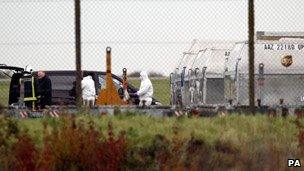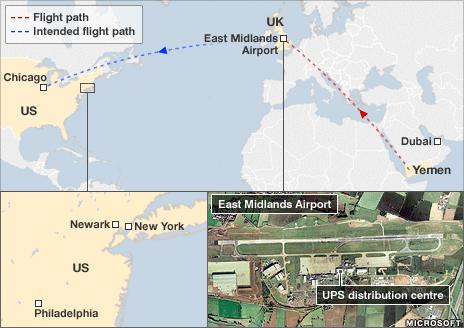Package found at East Midlands Airport had explosives
- Published

Part of East Midlands airport was sealed off twice as police investigated a "suspicious object"
A suspicious package found on a Chicago-bound plane at East Midlands Airport contained explosives.
US President Barack Obama said the package, discovered on a UPS cargo plane en route to America from Yemen, was addressed to a Chicago synagogue.
Home Secretary Theresa May said tests were ongoing, but it was "not yet clear that it was a viable explosive device".
She added: "There is nothing to suggest that any location in the UK was being targeted."
In a statement in the early hours of Saturday morning, Mrs May said the UK government was "working closely with our international colleagues" on the investigation.
"The package which originated in Yemen was removed for forensic examination by UK experts. That examination continues," she said.
"At this stage I can say that the device did contain explosive material. But it is not yet clear that it was a viable explosive device. The forensic work continues."
The home secretary said the government's emergency planning committee, Cobra, met on Friday to discuss the situation and would meet again on Saturday.
"We are reviewing the security measures for air freight from Yemen and are in discussion with industry contacts," she added.
Mrs May confirmed that direct flights from Yemen to the UK remained suspended after a flight ban was imposed following the failed terror attack over Detroit on Christmas Day.
Saudi Arabia
The package found at East Midlands was a toner cartridge with wires attached to it. Tests are now being carried out to establish what kind of explosive material it contained.
Mr Obama told a press conference in the United States that the package, and another discovered in Dubai, were addressed to two Jewish places of worship in Chicago.
A US official has told the BBC's Washington bureau that the intelligence tip that led to the discovery of the two suspect packages came from the Saudi Arabian authorities.
According to Scotland Yard, the plane travelling from Yemen to the US had first stopped at Cologne, in Germany, before landing at East Midlands Airport where its cargo was examined. Tests were carried out and a number of objects were sent for scientific examination.
Emergency services were called to the Donington site at East Midlands airport at about 0330 BST on Friday and evacuated a distribution centre. The area was reopened just before 1000 BST but a cordon was re-imposed just before 1400 BST so the package could be re-examined.
All cordons were lifted at about 1740 BST. No other UK airports were affected by the alerts.
The investigation led to the closure of a freight distribution building and a number of offices, along with two internal airport roads.
According to the Home Office, the current threat level from international terrorism to the UK is classed as severe, meaning a terrorist attack is highly likely.
'Howlers'
Prof Anthony Glees, director of the Centre for Security and Intelligence Studies at Buckingham University, told the BBC he was surprised that the threat level had not been raised to critical - meaning an attack is imminent - on Friday.
"From the soundings that I've been taking in Whitehall, it does seem to be the case that there was no specific intelligence coming to London that such an attack might be highly probable," he said.
"But clearly such intelligence was going through to the United States of America."
Prof Glees said Friday's incidents must be seen in the context of comments made this week by Martin Broughton, chairman of British Airways, about airport security.
Mr Broughton said many checks - such as the removal of passengers' shoes - were "completely redundant", and accused UK authorities of "kowtowing" to US security demands.
"Those statements must classify as some of the biggest security howlers in recent years," Prof Glees added.

- Published30 October 2010